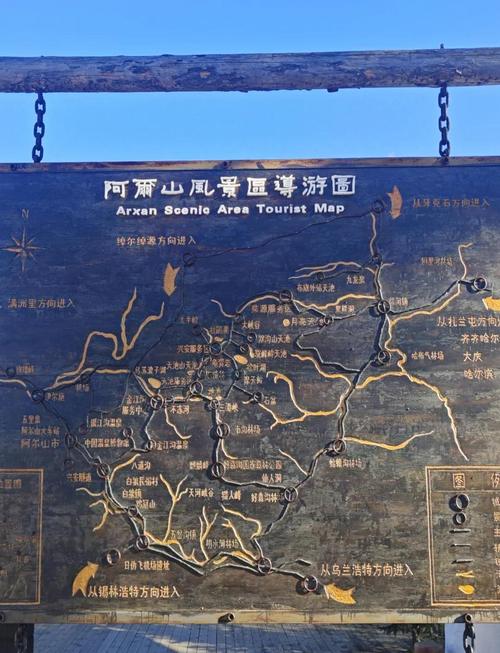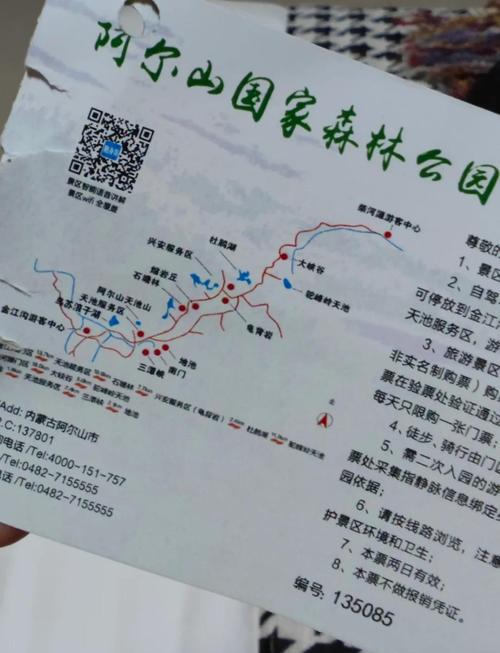阿尔山国家森林公园自驾游全攻略
阿尔山,不是一座山,而是一座因火山而生的梦幻小城,这里集天池、火山、森林、草原、温泉、湖泊于一体,被誉为“东方小瑞士”,自驾游是探索阿尔山最自由、最深入的方式,可以随时为绝美的风景停下脚步。

(图片来源网络,侵删)
行前准备
最佳旅行时间
- 夏季(6月-8月): 风景最佳,绿草如茵,野花遍地,气候凉爽,是避暑胜地,但也是旺季,游客较多,物价较高。
- 秋季(9月-10月初): 绝佳季节!层林尽染,金黄的白桦林、火红的枫叶与湛蓝的湖泊交相辉映,摄影爱好者的天堂。
- 冬季(12月-次年2月): 银装素裹,雪景童话世界,可以体验雪地温泉,但气温极低(-30°C以下),对车辆和驾驶技术要求较高,部分景点可能因大雪封闭。
车辆选择
- 首选SUV或越野车: 阿尔山景区内部分路段(如天池、石塘林)为砂石路,雨雪天气湿滑,底盘高的SUV通过性更好,更安全舒适。
- 检查车辆: 出发前务必全面检查车况,包括轮胎(包括备胎)、刹车、机油、防冻液等,建议加满油箱,景区内和周边村镇的加油站较少且价格略高。
必备物品
- 衣物: 早晚温差大,即使夏天也需备一件薄外套,秋冬季节则需羽绒服、雪地靴、帽子、手套、围巾等全套保暖装备。
- 防晒用品: 高海拔地区紫外线强烈,防晒霜、太阳镜、遮阳帽必不可少。
- 药品: 感冒药、肠胃药、创可贴、晕车药以及个人常用药,如果去徒步,可备上一些防蚊虫叮咬的药。
- 食品与饮水: 准备一些高热量零食(如巧克力、牛肉干)和充足的饮用水,以备不时之需。
- 其他: 相机、充电宝、身份证、少量现金(部分小摊位可能无法移动支付)、行车记录仪。
证件与费用

(图片来源网络,侵删)
- 身份证: 全程必备,入住酒店、景区购票都需要。
- 门票: 阿尔山国家森林公园实行通票制,价格为 150元/人,有效期为2天,入园时需要在游客中心刷身份证录入指纹,身高1.2米以下儿童免票,如果只在景区内玩一天,可以和售票处沟通购买单日票(价格可能略低于通票,但需确认)。
- 车辆: 进入公园的车辆需另付 105元/车 的入园费。
路线规划
核心路线:经典3日环线
这条路线覆盖了公园内90%以上的精华景点,节奏适中,适合大多数游客。
Day 1:抵达阿尔山,初探小城风情
- 上午/下午: 抵达阿尔山市区,办理酒店入住,建议住在温泉街附近,这里是市中心,吃饭、购物、泡温泉都方便。
- 下午: 逛逛阿尔山火车站(百年历史,网红打卡地),然后去阿尔山国家博物馆,了解火山地质和林区文化。
- 晚上: 体验一下阿尔山温泉,市内有多个公共温泉池,价格亲民,可以驱散一天的疲惫。
Day 2:经典核心景点环线(全天景区内)

(图片来源网络,侵删)
- 上午: 游览天池(必须爬999级台阶上去,俯瞰全景)、驼峰岭天池(更原始、更壮美)。
- 中午: 前往石塘林,这里是火山熔岩地貌的典型代表,寸草不生,怪石嶙峋,非常震撼。
- 下午: 游览地池(类似火山口的小湖泊)、杜鹃湖(夏季开满杜鹃花,冬季是绝佳的冰上运动场)、松叶湖、鹿鸣湖等。
- 傍晚: 驱车前往不冻河,在冬季看河面不结冰,水汽蒸腾,形成奇景;夏季则景色优美。
Day 3:边境风光与森林秘境
- 上午: 前往伊尔施镇,这里是进入阿尔山的门户,可以参观阿尔山国家森林公园地质博物馆,或去白狼峰(可自驾或乘坐景区车登顶,俯瞰林海)。
- 下午: 沿着S203省道向口岸方向行驶,一路是优美的森林公路,途中会经过奥伦布坎景区(可以体验森林小火车,但需另购票),最终到达阿尔山口岸(中蒙边境,感受异国风情)。
- 行程结束: 从口岸原路返回阿尔山市区,或直接从伊尔施镇上高速返程。
核心景点详解
-
天池群
- 天池: 最著名的一个,需要爬999级台阶,相传是火山口积水而成,池水不溢不涸,非常神秘。
- 驼峰岭天池: 规模更大,四周被茂密的森林环绕,景色原始秀美,是摄影爱好者的最爱。
-
石塘林
火山喷发后形成的熔岩台地,岩浆冷却后形成的石塘、石柱、洞穴遍布其间,仿佛到了外星球,旁边有温泉眼,可以感受热气腾腾。
-
不冻河
一段神奇的河流,即使在-30°C的严寒中,河段中心依然流水潺潺,不结冰,原因是河床有地热温泉流出,形成了“一半是冰,一半是水”的奇景。
-
杜鹃湖
因湖畔盛开着兴安杜鹃而得名,春季(5月底-6月初)杜鹃花盛开,湖面如镜,倒映花海,美不胜收,冬季则是一个巨大的天然溜冰场。
-
阿尔山国家森林公园地质博物馆
位于伊尔施镇,系统介绍了阿尔山的火山地质、森林生态、动植物资源,是了解这片土地的绝佳窗口。
-
白狼峰
公园内的制高点,可俯瞰整个林海,山顶有敖包,视野开阔,是日出和云海的绝佳观赏点。
美食与住宿
美食推荐
- 山野菜: 如蕨菜、薇菜、金针菇等,口感鲜嫩。
- 林区特色菜: 小鸡炖蘑菇、铁锅炖(炖鱼、炖排骨)、笨鸡炖榛蘑。
- 奶制品: 奶茶、奶豆腐、奶皮子,体验纯正的蒙古族风味。
- 烤全羊/烤羊腿: 如果人多,可以尝试地道的烤全羊。
- 推荐餐厅: 市区内的“老三馆”、“小肥羊”等都是本地人常去的馆子。
住宿建议
- 阿尔山市区(温泉街):
- 优点: 餐饮、购物、娱乐设施最齐全,选择多,性价比高。
- 缺点: 景区较远,每天需要往返,浪费时间。
- 适合人群: 预算有限、喜欢热闹、以泡温泉为主要目的的游客。
- 景区内(天池街或靠近主要景点):
- 优点: 节省每天进出景区的时间,方便清晨或傍晚拍摄,体验感更佳。
- 缺点: 价格较高,餐饮选择较少,相对商业化。
- 适合人群: 摄影爱好者、时间紧张的游客、追求高品质体验的游客。
注意事项
-
路况与驾驶:
- 景区内多为柏油路和砂石路,路况总体良好,但弯道较多,请减速慢行。
- 雨雪天气路面湿滑,务必谨慎驾驶,建议安装雪地胎。
- 手机信号在部分路段(如S203省道)可能不稳定,建议提前下载好离线地图。
-
防蚊虫: 夏季(尤其是6-7月)林区蚊虫较多,务必带




